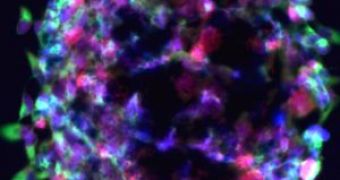Scientists announced they have high hopes that they might have discovered a new method for treating multiple sclerosis. Tests on lab mice showed that blocking the signal of a cell in the nervous system released mice of MS symptoms.
The exact cause of Multiple Sclerosis has not been tracked down yet, but scientists suspect that the severe disease is caused by a foreign agent, such as a virus, pollutant, parasite etc. Not knowing which the trigger of the disease is makes it extremely difficult for medical experts around the world to develop a treatment medication that would cure MS.
But researchers at the European Molecular Biology Laboratory (EMBL) in Italy and the Department of Neuropathology at the Faculty of Medicine, University of G?ttingen, Germany showed that turning off the signals of a specific nervous system cell alleviates Multiple Sclerosis symptoms and pain.
The signaling molecule responsible for most of MS symptoms is called NF-kB. "We have known for a long time that NF-kB is crucially involved in MS. Until now it was not clear if it was friend or foe. We were not sure whether it protects the brain cells against the consequences of the disease or actually aggravates the damage," stated the German researcher Manolis Pasparakis for the Nature Immunology Journal.
In experiments conducted in lab mice, experts blocked the NF-kB molecule and prevented it from signaling. In order to switch off the signal, scientists had to inactivate two others proteins, IKK2 and NEMO, who were known to activate the NF-kB cell. Results showed that when the signaling cell was turned off, Multiple Sclerosis symptoms became much milder and some of them were even completely stopped. But when the NF-kB molecule was activated again, the symptoms reappeared.
"NF-kB regulates the production of messengers that are released during inflammation to recruit and activate immune cells. Generally this is a good strategy to protect the body from infections. But in MS it is exactly these immune cells that cause the problem and their hyper activation through NF-kB only makes the situation worse," explained Dr. Marco Prinz from the University of G?ttingen, who was also involved in the study.
Scientists are now aiming at developing a new treatment method which could turn off the signaling molecule found in the nervous system. However, further research is needed before MS patients can rejoice at the hope of benefiting from the new therapy. Trials are rather difficult to be performed and scientists still have a long way to go.
"This was quite a challenge because NF-kB is involved in many crucial processes throughout the entire body, and shutting down its activation in all cells kills the mouse before it is born. To observe the effect of NF-kB in MS, we used sophisticated genetic techniques to generate mice that do not express IKK2 and NEMO in brain cells only," said Dr. Manolis Pasparakis.

 14 DAY TRIAL //
14 DAY TRIAL //